Is Kabaneri of the Iron Fortress Just An Attack On Titan Clone?
by Jacob Chapman,The countryside has been devastated by undead humanoid monsters, forcing humanity into packed walled cities ruled by fear and a rigid class structure. Then disaster strikes when those monsters devastate our hero's hometown and set him on a path to revolution. Now he'll have to embrace the monster inside himself to beat back the undead horde and reclaim his world for humanity.

What? No, it's not season two of Attack on Titan! Studio Wit and Tetsuro Araki are apparently still working out the bugs on more Titan, so it's a good thing that their current project, Kabaneri of the Iron Fortress, is so completely different in every way.

Well, if you ignore that paragraph of plot summary that applies identically to both shows.
It's painfully obvious that Kabaneri of the Iron Fortress would not exist without the success of Attack on Titan, so it's also just plain weird that Titan's own home studio and director would take a break from their established megahit to make such a blatant "rip-off" of it instead. The exact reasons behind Kabaneri's production (and its shameless timing) remain a mystery, but I have my own theory: I don't think Kabaneri is a rip-off of Titan at all. Sure, it was definitely inspired by that gigantic franchise, but I think it's also clear that Tetsuro Araki saw the manga he was adapting and thought, "If I had just this premise in front of me, I would write things completely differently." And he did! Once you get past those surface similarities, Kabaneri of the Iron Fortress stands strong on its own, and here are just a few reasons why.
A Different World
The world of Attack on Titan is dense and elaborate. Even after 25 episodes of the anime, we've barely cracked the surface of everything going on inside those walled cities. But to be perfectly honest, it's also easy to sum up Titan's universe in one little word.




It's Brown. My god, is it Brown.
I love Attack on Titan for its engrossing (or even just plain gross) concept and storytelling, but aesthetically, it's never been the prettiest girl at the dance. Even when the animation and direction has you on the edge of your seat, most of what you're looking at is brown dirt, brown buildings, and brown uniforms, with the occasional splash of dark gray or forest green. (And the Female Titan arc will probably make you sick of that shade of green too.) As Mikasa says, it's a cruel world, and I guess cruelty comes with a drab color palette. The character designs stand out for their crazy facial expressions and detailed musculature, but it only makes sense that these earthy kids would need to blend into their earthy world. Attack on Titan uses the ugliness of its environment to make its drama stronger. It's a very detailed production, but it's not at all glamorous, and it isn't supposed to be.
But who says things can't be a little more glamorous, even in a harsh world? What if you could make the zombie apocalypse look just a little more like a Studio Ghibli production and, in the process, create something new?


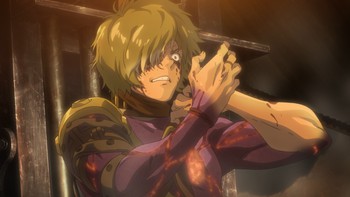

Kabaneri of the Iron Fortress turns its own drab and hopeless world into something gorgeous, creating a hellscape you might not mind visiting. Even if you love the way Attack on Titan looks, it doesn't take place in the kind of world you would ever want to live in, but Kabaneri succeeds more as spectacular escapism, especially if you're partial to steampunk. The show is always playful and generous with its use of color and light, even in its brownest and dirtiest places. There are bright blue skies, pastel pink kimonos, and even radiant purple zombie guts with fiery orange blood vessels pulsing through them. There's a spark of beauty in every scene, and the final product looks like no other anime out there.
Kabaneri's characters also have a more inviting softness to them than the sharp shonen edges of Titan's cast, courtesy of character designer Haruhiko Mikimoto. His work has been legendary in anime fandom since the '80s, but rarely able to be fully realized in animation because of its distinctive delicacy. If you're a big Macross fan, you might want to check out Kabaneri just to see Mikimoto's unique designs given life like never before. Thanks to some innovative post-production techniques, Kabaneri of the Iron Fortress achieves a more glossy and theatrical look that makes zombie slaughter look more awesome than frightening. The kabane don't convey the terror or discomfort that the Titans do, but they're not supposed to. They're baddies in a much brighter world, with much brighter heroes.
Speaking of which...
A Different Hero

Eren Jaeger is not the sharpest tool in the shed, but he is definitely a tool. His bullheaded recklessness invites a lot of irritation from some of the show's fans, but I think that's kind of the point. You don't have to like Eren, and most of the time you probably shouldn't, but that's because he's an extremely familiar type of 15-year old boy. Much of the series is spent mashing Eren's face into the dirt, reminding him over and over again that he has a ton of growing up to do. Like most shonen protagonists, he's weaker and stupider than a lot of his peers, but he fights to his last breath for what he believes, which is the only thing keeping him going. But unlike most shonen protagonists, Eren doesn't live in a world where friendship and perseverance make all your problems go away, so the story's relentless punishment of his failures can have some audience members wondering why this little screw-up is the hero in the first place. Attack on Titan is more like Evangelion or Tokyo Ghoul than Naruto or My Hero Academia, which means its teenage lead's foolishness can hit a little too close to home sometimes. At least, that's how I feel about Eren. I think he's a great protagonist, because I don't think he has to be likable to be great.
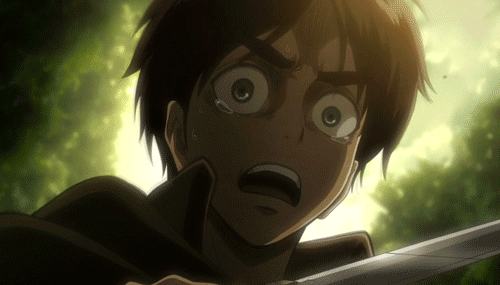
Still, sometimes you're not in the mood for a Shinji Ikari or Ken Kaneki-style "sad protag." Maybe it would be nice to have a lead guy who isn't blandly flawless, but still lovable enough to root for without reservation. It's a hard balance to strike, but I think Kabaneri of the Iron Fortress nailed it with the immediately memorable Ikoma.

First of all, Ikoma is a big old nerd, and I don't just mean in a generic "he's smart" kind of way. This bespectacled fuzzhead didn't just inherit the "cool" parts of geekiness you see in more forgettable nerd heroes. Ikoma remains relatable thanks to his flaws, like rough social skills and an insistence on winning every argument, but he's also got a sensitive heart and sincere desire to be appreciated for his talents. And unlike the super-average Eren who gets superpowers by accident, Ikoma is very talented! He's an experienced steam engineer at first, but dabbles in amateur biology to research a cure for zombification (and weapons for busting up kabane). He's also not afraid to start learning hand-to-hand combat from a 12-year old girl or swordsmanship from a mean rival, when his role changes from scientist to bodyguard aboard a train full of refugees. His curiosity knows no bounds, and he doesn't let insecure bullies or old superstitions get in his way. On top of all that, he's extremely compassionate, frequently sacrificing himself to protect strangers and lending an ear to other people's problems, even if the brusque advice he gives in return is, well, pretty nerdy.
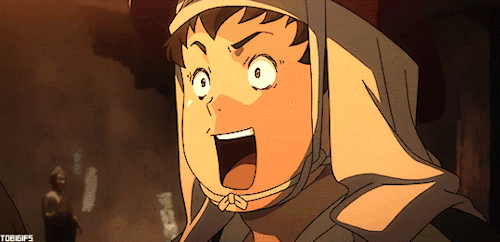
I don't think the writers of Kabaneri of the Iron Fortress were trying to make a "nerd hero" that everyone would love, and Ikoma can definitely strike a sour note for some viewers, but I think he's one of the strongest things about the show, which wouldn't have worked at all with another Eren Jaeger.
Why is that? Well...
A Different Attitude
It may be classified as shonen, but I think Attack on Titan is more of a grim horror story than anything else. Sure, there are moments of triumph and optimism that peek through the storm, but most of this story is a downhill spiral. In Titan's world, every new day is a struggle against death, trauma, and cruelty for just one reward: survival. If the Titans don't eat you in grueling slow motion, your fellow man will probably stab you in the back just to take what little you have. One old military commander even remarks that if the existence of Titans hadn't gotten humans to band together and stop fighting, nothing ever would, so maybe we were just done for as a species anyway. Nothing speaks more to Titan's cynical worldview than the moment Eren returns home for the first time as a Survey Corps soldier, the "hero" he always wanted to be, only feeling more empty and defeated inside than ever before.

"The world is cruel, but you can find beauty in it" is a pretty good way to sum up Attack on Titan's delicate balance of shonen and horror. (Thanks for the quote, Mikasa!) Even if the show eventually concludes in a "happy" ending, it's definitely drinking deep from a glass half-empty. There's still hope for humanity in a cynical story, even if the ride is dark and full of terrors.
But you don't have to worry about any of that in Kabaneri of the Iron Fortress. In Kabaneri, everything is going to be just peachy, because killing zombies is awesome.
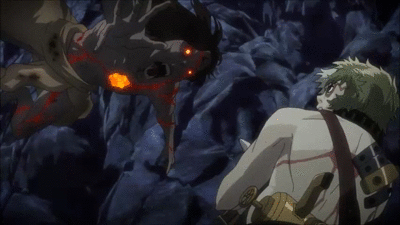
No matter how dire the fight becomes, Kabaneri of the Iron Fortress always keeps its spirit of adventure high. There are hulk-zombies, dual-wielding samurai zombies, and even titanic blob monsters made of thousands of other zombies, but they all just seem like different levels of video game enemy for our heroes to conquer in jaw-dropping fashion. Ikoma, Mumei, Ayame, and friends have a rascally Hollywood ragtags thing going on that keeps them insulated from any nihilistic death that might befall the poor soldiers of Attack on Titan. That's not to say Kabaneri has no sense of danger, though. The show's action scenes are exhilarating, but the thrill comes more from seeing how the iron train's refugees will survive each checkpoint, rather than if they will survive. The cast is constantly evolving their weaponry and tactics to face each new challenge, and the show's surprising optimism always rewards their efforts. The threats around them get bigger and uglier, but they always piece together a solution with plenty of explosive spectacle for our entertainment.
Despite higher levels of gore, Kabaneri isn't a horror story like Attack on Titan at all. It's an action-adventure on the road (rails?), where every episode is a little bigger and crazier than the last. But no matter what happens, it seems like our heroes can make it through, so long as they stick together and never stop fighting.
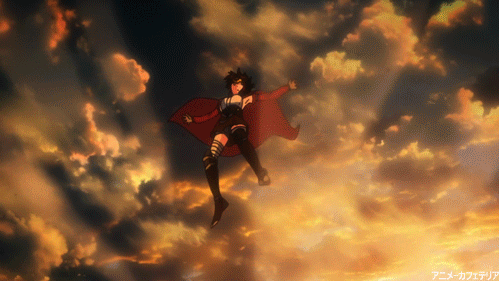
So I'm happy to enjoy both Attack on Titan and Kabaneri of the Iron Fortress as their own exciting experiences, embracing all their similarities and differences as part of the fun. So which do you prefer? Titan or Kabaneri? Tell us what you think of these two giant-sized anime hits in the forums!
discuss this in the forum (67 posts) |